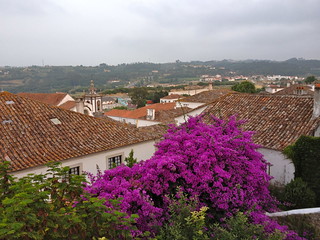 Somewhere out in the country side of western Portugal, I’m driving around dodging goats and tractors while reflecting on life’s challenges when you exist across borders. Instead of the usual world news issues and under reported news this is a more traditional stream-of-conciousness podcast that some people out there may be able to relate to when it comes to old age, economic problems, small towns, and ch-ch-changes. Join me on the back roads and highways of Portugal’s loveliest pear and wine regions.
Somewhere out in the country side of western Portugal, I’m driving around dodging goats and tractors while reflecting on life’s challenges when you exist across borders. Instead of the usual world news issues and under reported news this is a more traditional stream-of-conciousness podcast that some people out there may be able to relate to when it comes to old age, economic problems, small towns, and ch-ch-changes. Join me on the back roads and highways of Portugal’s loveliest pear and wine regions.
Tag Archives: culture
A Living Podcast History
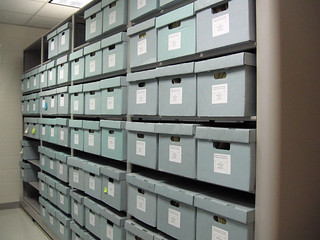
Most discussions of blogging or podcasting history immediately sound crazy because they all involve an allegedly “long” span of about 12 to 14 years. As crazy as it may sound, when it comes to the internet, 12 years is an eternity. When it comes to life, however, 12 years goes by in the blink of an eye.
This spring I have rediscovered a podcast I used to listen to regularly, The Overnightscape, hosted by Frank Edward Nora who several times a week takes you along during his commute to work from New Jersey to Manhattan and occasionally invites you to relax at home with him or with a friend as they talk about everything from pop-culture to history and generally, things going on in Frank’s mind. Back in 2004, when podcasting first officially started, Frank’s style of recording would have been called stream of consciousness, which could be one of the greatest examples of what made the voices and style of podcasting so unique. No radio program would ever have had the nerve and patience to allow a host to just think out loud without a time limit, but the freedom and honestly of podcasting was the perfect place for it.
Though we’re not far from podcasting turning a decade old, strangely many of those podcasts that were so unique and experimental have disappeared. Producers of these programs stopped for a wide range of reasons, among them: the lack of financial resources to continue, the lack of returns in the form of feedback (or perhaps money), the demands of a day job or other offline life requirements, loss of interest, or as Ivan explained on a recent edition of the podcast – some projects need to end. Among today’s remaining independent podcast programs, there is a mix of specialized topics which often involve interviews and just a few long running monologue (stream of consciousness) type shows. (my favorite being the incomparable Yeast Radio) Many of these have faced their own critical moments where things almost shut down for good but then fortunately made it through and carry on still today.
Yet despite what we still have in terms of audio (and video) creators, many great ones have hung up their spurs and called it quits. There are countless audio and video files who’s hosting accounts ceased to exist and are therefore no longer available online. Time and the internet keep moving forward, things change, and what seems at present so permanent, can disappear so easily. At the recent gathering of creative minds during Re:publica12 in Berlin there was a group of people looking for like-minded individuals interested in archiving and preserving blogs. The familiar idea- that one day many of us and/or our websites will be gone and the only way to preserve this valuable (or valueless) work is to put it somewhere in such a manner that it will still be accessible well into the future.
With all this in mind I notice wordpress telling me that I will soon reach 2000 posts on citizenreporter.org. 2,000 posts, 420 podcasts and counting- will it all still be accessible in 12 years? I very much hope so.
Stories for Those Who Love Storytelling
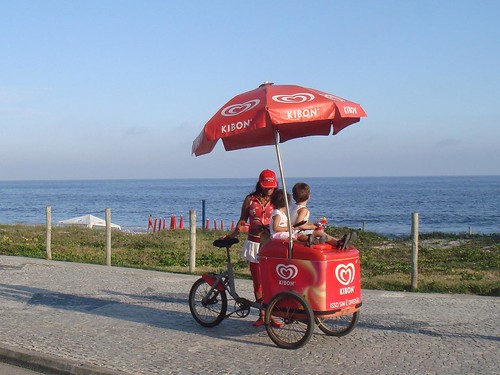
Annie Correal knows all about the nature of the news reporting business and the internet of news feeds and hypersharing. But she also knows a world where people take time to tell their stories and listen to one another. The online world of reading, writing and recording where taking time and moving perhaps a little more slowly, is well worth the wait. Her work with both Cowbird and Radio Ambulante reveals two such places where people from all walks of life are coming together, and sharing life in a very significant way.
Today on the podcast I get to know Annie Correal, and ask her questions about how she got started as a journalist to how and why these two special projects became part of her life. Join us for what I believe is a very important and enjoyable conversation. Then go tell stories of your own!
How Do We Get There From Here
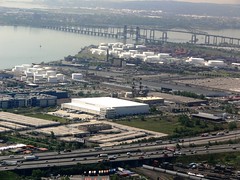
As the sun disappears behind the concrete horizon, I look across the 10 lanes of highway that are currently all filled with cars moving extremely slowly. Everyone in their own vehicle on their way back from work heading home, everyone hoping this traffic will clear up, just as they hope everyday around this time. The highway is massive and bleak, with shards glass and tiny nondescript car pieces along the shoulder. The sound barriers couldn’t possibly block out all this sound, but communities along the highways of New Jersey figured that out long ago. Most of them are used to the 24 hour, year after year sound of trucks and cars roaring in the direction of New York or Pennsylvania.
This is New Jersey in 2012. This was New Jersey in 1992. A few decades pass, but other than the shape and design of the newer cars on the road, the feeling has not changed. If anyone happens to tune into news in the car, they could surely hear a report about the state of the world, specifically about the environment and the point to which humans are pushing it through our own collective behavior. But thats just on the news, the story out there is doing the daily routine. Getting through the day. Making that car payment. Paying that mortgage. Living that life we were taught to live.
Along the highway, between the occasional tree or building, there are the billboards. One in particular is for solar energy for your home. There’s a phone number under a picture of a solar panel. I wonder how many people have dialed it and how things are working out for them. A Prius pulls in front of me, I almost forgot there were hybrid vehicles out here among the SUV’s and livery cabs. The exit ramp takes me around and over the highway, the bridge I grew up crossing everyday looks worn and crumbling. The etched date in the concrete reads: 1974. I wonder how much we’ve really learned since then.
Peeling Layers of Dubai
Almost one year since my first ever visit to Dubai last summer, I find myself here again for a few days in preparation of a new project in Afghanistan. The details of the project I will leave to an upcoming post. The details of my days in Dubai is what I wish to talk about today.
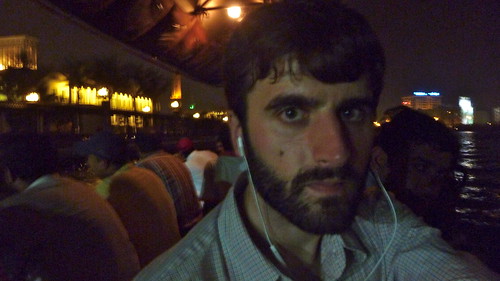
It has been done to death and you can include my name among them, writing about Dubai with disdain calling it a capitalist experiment gone bad or gone too far or without a soul. Its easy to poke fun at a city that is so modern and busy yet so empty and transient. See there I go, doing what the reporters who are here for 5 minutes tend to do. Hard to resist.
To properly peel away the layers Dubai has it would take months if not years. The people who could do a proper job explaining it all are too busy trying to earn a living and send it back to their loved ones in Pakistan. In India. In Afghanistan. In the Philippines. In Bangladesh. Insert a nationality. The world is in Dubai. The emirates may claim it as their own and control things from a government level, but Dubai, no matter what they say, is firmly property of the world.
Somewhere along the way these polite gentleman in their eye-catching bright and clean white uniforms with that sweeping part that covers their head with the ever so well positioned black headband.. those gentleman did whatever they could to attract the world to their port city in the desert. They knew they had oil but they also knew that in this world, oil is not enough, so they sought to make something more. Tourism. Banking. Business. In the process they needed a massive amount of help. So they invited workers from all over the world, especially their nearby neighbors in South Asia. And so they came, mostly on their own leaving families at home. To drive the taxi’s, cook the food, collect the garbage, pick a job… there are so many that they do. In the course of 20 or so years… a port city with some oil reserves and a population of just over half a million, became an international economic engine of almost a million and a half. The city few knew about, became a name everyone knows about, even if they’ve never set foot on UAE’s sun scorched soil.
“21 years I have been here sir,” my driver from Peshawar tells me as we sit in mid-day traffic, “back then there was nothing like this. Maybe one shopping mall, now we have too many. And these huge buildings and the hotels. Nothing like this.” He sits in silence for a few minutes, cab drivers in Dubai will tell you of their lives, but they don’t like to carry on. Straight to the point: “I can never bring my family here. The money I make driving taxi could never pay rent for a family house. No no. I send some to my family and there we have a house. I even have enough to be a landlord of a second property. Here is just work. Its the only way.” He goes on to talk about the violence and risks in Pakistan. He is upset and disillusioned with the politics and innocent people who lose their lives. But bringing them to Dubai is not an option. 21 years and it is not an option. In effort to bring some positive energy back I ask him about Pakistan’s nature and beauty and his eyes light up as he describes all the lush countryside.
The next evening I’m in a trendy Thai restaurant in a residential neighborhood. The place is packed with locals, Indian and other South Asian accents all around. Surprisingly an Emirate man, in the signature white robe, sits with his family who seem themselves to be South Asian. They’re posing for photos and passing around a cute little baby. Back at the hotel there’s a sign, Prom 2011, and all around me are Indian teenagers and all their drama. Listening to their petty arguments and clever jokes, I could have been anywhere in Europe or North America hearing the exact same thing. High School in Dubai, here are the children of the people who are raising their families in this land where they are forever guests. What will become of them in the future?
Critics will point to the lack of rights. Even the abuse of guest workers. Even the term guest workers reminds us that these people from all over the world living and working here are never allowed to become citizens. A sad fact for those who have toiled for so long and help make this city what it is everyday. But putting that sadness aside, even potential power counts for something, so although the law may not be on their side, there is power in this massive population that call Dubai home and without their everyday contributions, this place would shut down.
The Importance of Being EU
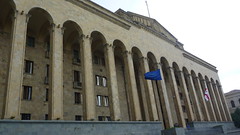
As I walk by Georgian Parliament on my way to the nearby café in the morning, I notice two flags always flying out front: The Georgian ride and white flag, and the European Union navy blue with yellow stars flag (Georgia is a part of the Council of Europe among other institutions). When I discuss the position of Georgia in the world, although bordered by nations like Russia and Armenia (to name 2) it is widely proclaimed that Georgia is part of Europe. Like numerous nations located even closer to the heart of the European Union, the goal here is very much to one day be part of the European Union. Why? Although I don’t usually get a specific answer, the implied answer is a sense of belonging. Perhaps also the goal of achieving the quality of life similar to that which it is thought members of the EU enjoy. Or to make it even more basic, one major reason is to further distance this place from Russia, a nation that is – to put it mildly- disliked. As part of not liking Russia, there is the goal to make sure the world knows (as well as Russia itself) that Georgia is very much with those guys over there on the other side of the Black sea. No longer a victim of their occupation but standing on its own two feet with its European friends.
Now compare this sentiment with that in Southern Europe these days, where people are enraged and disillusioned; not exactly with the European Union, but with their own governments who of course are members of the EU and have presided over, if not played a role in, a massive economic collapse and policy failure. While some nations in the EU curse their governments for not representing them in what is financially a very troubled union, here we find those outside wishing to get in. With what seems like very different goals, at least when it comes to the symbolic desire to be EU… maybe Georgians would find more happiness in being a member state, even if the economy looks pretty bad.
In the coming days here in Tbilisi, I’ll of course hear more about this bid to be part of the EU and the primary reasons for it. I’ll report back with what I learn.